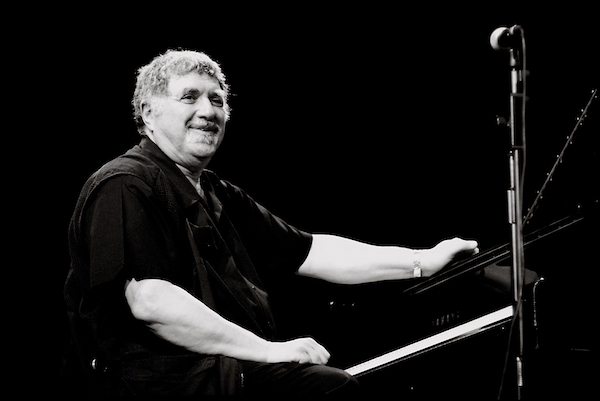Jan 13, 2026 2:09 PM
More Trump-Kennedy Center Cancellations
The fallout from the renaming of the John F. Kennedy Center for the Performing Arts to include President Donald…

Hal Galper didn’t recognize his own playing when he first heard the recording of The Zone: Live At The Yardbird Suite.
(Photo: Carlos Pinto)In 1997, Seattle musicians Matt Jorgensen and John Bishop birthed Origin Records, an independent label “run by musicians for musicians.” An instrumentalist-led jazz label was a daring concept 23 years ago, when players had few recording options aside from those that the majors provided. But Origin was nothing if not daring. Under Jorgensen’s guidance, the label also was an early adopter of online music promotion and distribution, an innovative stance that helped its founders expand further into the global jazz market.
Today, Origin comprises four brands—jazz imprints Origin Records and OA2 Records, Origin Classical, and Origin World—and has released more than 600 albums.
The artists who found a home with the label—at least 300 internationally—represent different styles and echelons of jazz, from guesting headliners like drummer Brian Blade and saxophonist Joshua Redman to the vocal group New York Voices and regional jazz names like Seattle pianist/singer Dawn Clement, Philadelphia saxophonist Tom Tallitsch and Chicago guitarist Erik Skov.
What these artists all have in common—besides the hard-working label behind them—is demonstrably superlative musicianship.
When pianist Hal Galper first heard the live recording that became The Zone: Live At The Yardbird Suite (Origin 82793; 58:28 ****), he didn’t recognize his own playing. On that November 2016 gig—at the eponymous club in Edmonton, Canada—“the music came from some place deeper,” Galper wrote in the album’s liner notes. The bandleader, who’s a long way from his 1970s electrified workouts on the Mainstream imprint, called that place “the zone,” where the affinity with his trio (bassist Jeff Johnson and drummer Bishop) is spontaneous, tight and magically intuitive. Generated in the zone, these seven exquisite tracks churn with excitement and subtlety under Galper’s spellbinding touch.
For his third Origin album with the Circle 3 Trio, Interaction (Origin 82792; 61:14/51:57 ***1/2), bassist/pianist David Friesen debuts some new material while borrowing strategically from his earlier Origin albums like My Faith, My Life; Structures; and Bactrian. Captured on two discs—one a studio session and the other a live recording—the contrasting versions of the reprised tunes lend insight into Friesen’s cool, sophisticated creativity. And while there are many arresting moments on these paired discs, none are more sweetly aching than Friesen’s folksy comping to Joe Manis’ thoughtful saxophone solo on the final track, “My Faith, My Life.”
On Immigration Nation (OA2 22177; 78:56 ****), versatile trumpeter and composer Charlie Porter utilizes modern jazz vernacular to make a social statement about contemporary life in the United States: Our forebears and our music all derive from someplace else. Rather than preach, however, he shows how it works. On Part I: Leaving Home, the first six tunes, he celebrates the rich rhythmic vitality of American jazz forms, and on Part II: New Beginnings, he explores the synthesis of differing musical thoughts. A former student of Wynton Marsalis, Porter’s playing is fluid, expressive and magnificent.
On Lolly Allen’s infectiously jocund Coming Home (OA2 22178; 55:44 ***1/2), the vibraphonist recalls the 1950s club scene in Los Angeles with bright remakes of tunes like Horace Silver’s “The Hippest Cat In Hollywood” and Dizzy Gillespie’s “Bebop.” But Allen has her own view of L.A. jazz: Her originals—like the bracing “Little Hummingbird” and the colorful title track—are steeped in modernity. The sleek Lolly Allen Quintet, with additional horns and a guitar on two tracks, matches its bandleader in energy and wit; as they pass through their solos, you’ll wish you could join in.
For City Abstract (Origin 82788; 55:22 ***1/2), Dan McCarthy penned six dynamic originals to celebrate the work of two of his mentors, pianist Carla Bley and fellow vibraphonist Gary Burton. To start, he opens the album with “Bleyto (For Carla Bley),” an uptempo, ringing tune with post-bop vitality that stands in stylistic contrast with the closing track, “Desert Roads (For Gary Burton),” with its galloping jazz-rock groove. In between these vibrant bookends, McCarthy delves into beautiful vibes-guided meditations on tunes like Keith Jarrett’s “Coral,” Pat Metheny’s “Midwestern Nights Dream” and his own “Other Things Of Less Consequence.” DB

Belá Fleck during an interview with Fredrika Whitfield on CNN.
Jan 13, 2026 2:09 PM
The fallout from the renaming of the John F. Kennedy Center for the Performing Arts to include President Donald…

Peplowski first came to prominence in legacy swing bands, including the final iteration of the Benny Goodman Orchestra, before beginning a solo career in the late 1980s.
Feb 3, 2026 12:10 AM
Ken Peplowski, a clarinetist and tenor saxophonist who straddled the worlds of traditional and modern jazz, died Feb. 2…

The success of Oregon’s first album, 1971’s Music Of Another Present Era, allowed Towner to establish a solo career.
Jan 19, 2026 5:02 PM
Ralph Towner, a guitarist and composer who blended multiple genres, including jazz — and throughout them all remained…

Rico’s Anti-Microbial Instrument Swab
Jan 19, 2026 2:48 PM
With this year’s NAMM Show right around the corner, we can look forward to plenty of new and innovative instruments…

Richie Beirach was particularly renowned for his approach to chromatic harmony, which he used to improvise reharmonizations of originals and standards.
Jan 27, 2026 11:19 AM
Richie Beirach, a pianist and composer who channeled a knowledge of modern classical music into his jazz practice,…